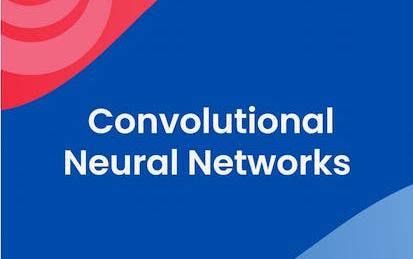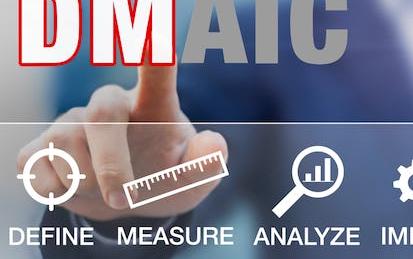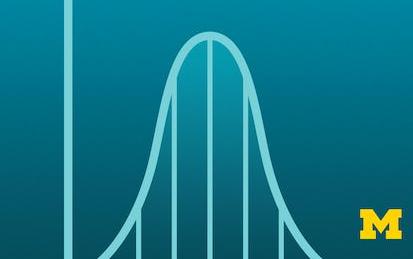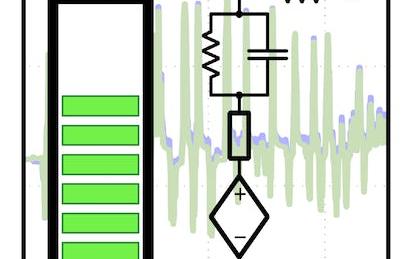

دوراتنا

Natural Language Processing with Attention Models
In Course 4 of the Natural Language Processing Specialization, you will: a) Translate complete English sentences into Portuguese using an encoder-decoder attention model, b) Build a Transformer model to summarize text, c) Use T5 and BERT models to perform question-answering. By the end of this Specialization, you will have designed NLP applications that perform question-answering and sentiment analysis, and created tools to translate languages and summarize text! Learners should have a working knowledge of machine learning, intermediate Python including experience with a deep learning fra
-
Course by

-
 Self Paced
Self Paced
-
 35 ساعات
35 ساعات
-
 الإنجليزية
الإنجليزية

Bayesian Statistics: From Concept to Data Analysis
This course introduces the Bayesian approach to statistics, starting with the concept of probability and moving to the analysis of data. We will learn about the philosophy of the Bayesian approach as well as how to implement it for common types of data. We will compare the Bayesian approach to the more commonly-taught Frequentist approach, and see some of the benefits of the Bayesian approach. In particular, the Bayesian approach allows for better accounting of uncertainty, results that have more intuitive and interpretable meaning, and more explicit statements of assumptions.
-
Course by

-
 Self Paced
Self Paced
-
 12 ساعات
12 ساعات
-
 الإنجليزية
الإنجليزية

Summary Statistics in Public Health
Biostatistics is the application of statistical reasoning to the life sciences, and it is the key to unlocking the data gathered by researchers and the evidence presented in the scientific literature. In this course, we'll focus on the use of statistical measurement methods within the world of public health research. Along the way, you'll be introduced to a variety of methods and measures, and you'll practice interpreting data and performing calculations on real data from published studies.
-
Course by

-
 Self Paced
Self Paced
-
 15 ساعات
15 ساعات
-
 الإنجليزية
الإنجليزية

Predictive Modeling and Machine Learning with MATLAB
In this course, you will build on the skills learned in Exploratory Data Analysis with MATLAB and Data Processing and Feature Engineering with MATLAB to increase your ability to harness the power of MATLAB to analyze data relevant to the work you do. These skills are valuable for those who have domain knowledge and some exposure to computational tools, but no programming background.
-
Course by

-
 Self Paced
Self Paced
-
 22 ساعات
22 ساعات
-
 الإنجليزية
الإنجليزية

Probabilistic Deep Learning with TensorFlow 2
Welcome to this course on Probabilistic Deep Learning with TensorFlow! This course builds on the foundational concepts and skills for TensorFlow taught in the first two courses in this specialisation, and focuses on the probabilistic approach to deep learning. This is an increasingly important area of deep learning that aims to quantify the noise and uncertainty that is often present in real world datasets.
-
Course by

-
 Self Paced
Self Paced
-
 53 ساعات
53 ساعات
-
 الإنجليزية
الإنجليزية

Bayesian Statistics: Techniques and Models
This is the second of a two-course sequence introducing the fundamentals of Bayesian statistics. It builds on the course Bayesian Statistics: From Concept to Data Analysis, which introduces Bayesian methods through use of simple conjugate models. Real-world data often require more sophisticated models to reach realistic conclusions. This course aims to expand our “Bayesian toolbox” with more general models, and computational techniques to fit them.
-
Course by

-
 Self Paced
Self Paced
-
 30 ساعات
30 ساعات
-
 الإنجليزية
الإنجليزية

Exploratory Data Analysis for Machine Learning
This first course in the IBM Machine Learning Professional Certificate introduces you to Machine Learning and the content of the professional certificate. In this course you will realize the importance of good, quality data.
-
Course by

-
 Self Paced
Self Paced
-
 14 ساعات
14 ساعات
-
 الإنجليزية
الإنجليزية

Big Data Emerging Technologies
Every time you use Google to search something, every time you use Facebook, Twitter, Instagram or any other SNS (Social Network Service), and every time you buy from a recommended list of products on Amazon.com you are using a big data system. In addition, big data technology supports your smartphone, smartwatch, Alexa, Siri, and automobile (if it is a newer model) every day. The top companies in the world are currently using big data technology, and every company is in need of advanced big data technology support.
-
Course by

-
 Self Paced
Self Paced
-
 30 ساعات
30 ساعات
-
 الإنجليزية
الإنجليزية

Improving your statistical inferences
This course aims to help you to draw better statistical inferences from empirical research. First, we will discuss how to correctly interpret p-values, effect sizes, confidence intervals, Bayes Factors, and likelihood ratios, and how these statistics answer different questions you might be interested in. Then, you will learn how to design experiments where the false positive rate is controlled, and how to decide upon the sample size for your study, for example in order to achieve high statistical power.
-
Course by

-
 Self Paced
Self Paced
-
 28 ساعات
28 ساعات
-
 الإنجليزية
الإنجليزية

Exploratory Data Analysis with MATLAB
In this course, you will learn to think like a data scientist and ask questions of your data. You will use interactive features in MATLAB to extract subsets of data and to compute statistics on groups of related data. You will learn to use MATLAB to automatically generate code so you can learn syntax as you explore.
-
Course by

-
 Self Paced
Self Paced
-
 19 ساعات
19 ساعات
-
 الإنجليزية
الإنجليزية

Data Processing and Feature Engineering with MATLAB
In this course, you will build on the skills learned in Exploratory Data Analysis with MATLAB to lay the foundation required for predictive modeling. This intermediate-level course is useful to anyone who needs to combine data from multiple sources or times and has an interest in modeling. These skills are valuable for those who have domain knowledge and some exposure to computational tools, but no programming background.
-
Course by

-
 Self Paced
Self Paced
-
 20 ساعات
20 ساعات
-
 الإنجليزية
الإنجليزية

Six Sigma Advanced Define and Measure Phases
This course is for you if you are looking to dive deeper into Six Sigma or strengthen and expand your knowledge of the basic components of green belt level of Six Sigma and Lean. Six Sigma skills are widely sought by employers both nationally and internationally. These skills have been proven to help improve business processes and performance.
-
Course by

-
 Self Paced
Self Paced
-
 15 ساعات
15 ساعات
-
 الإنجليزية
الإنجليزية

Basic Statistics
Understanding statistics is essential to understand research in the social and behavioral sciences. In this course you will learn the basics of statistics; not just how to calculate them, but also how to evaluate them. This course will also prepare you for the next course in the specialization - the course Inferential Statistics. In the first part of the course we will discuss methods of descriptive statistics. You will learn what cases and variables are and how you can compute measures of central tendency (mean, median and mode) and dispersion (standard deviation and variance).
-
Course by

-
 Self Paced
Self Paced
-
 27 ساعات
27 ساعات
-
 الإنجليزية
الإنجليزية

Understanding and Visualizing Data with Python
In this course, learners will be introduced to the field of statistics, including where data come from, study design, data management, and exploring and visualizing data. Learners will identify different types of data, and learn how to visualize, analyze, and interpret summaries for both univariate and multivariate data.
-
Course by

-
 Self Paced
Self Paced
-
 21 ساعات
21 ساعات
-
 الإنجليزية
الإنجليزية

Foundations of Data Science: K-Means Clustering in Python
Organisations all around the world are using data to predict behaviours and extract valuable real-world insights to inform decisions. Managing and analysing big data has become an essential part of modern finance, retail, marketing, social science, development and research, medicine and government. This MOOC, designed by an academic team from Goldsmiths, University of London, will quickly introduce you to the core concepts of Data Science to prepare you for intermediate and advanced Data Science courses.
-
Course by

-
 Self Paced
Self Paced
-
 29 ساعات
29 ساعات
-
 الإنجليزية
الإنجليزية

Bayesian Statistics: Mixture Models
Bayesian Statistics: Mixture Models introduces you to an important class of statistical models. The course is organized in five modules, each of which contains lecture videos, short quizzes, background reading, discussion prompts, and one or more peer-reviewed assignments. Statistics is best learned by doing it, not just watching a video, so the course is structured to help you learn through application. Some exercises require the use of R, a freely-available statistical software package.
-
Course by

-
 Self Paced
Self Paced
-
 22 ساعات
22 ساعات
-
 الإنجليزية
الإنجليزية

State Estimation and Localization for Self-Driving Cars
Welcome to State Estimation and Localization for Self-Driving Cars, the second course in University of Toronto’s Self-Driving Cars Specialization. We recommend you take the first course in the Specialization prior to taking this course. This course will introduce you to the different sensors and how we can use them for state estimation and localization in a self-driving car.
-
Course by

-
 Self Paced
Self Paced
-
 27 ساعات
27 ساعات
-
 الإنجليزية
الإنجليزية

Introduction to Statistics & Data Analysis in Public Health
Welcome to Introduction to Statistics & Data Analysis in Public Health! This course will teach you the core building blocks of statistical analysis - types of variables, common distributions, hypothesis testing - but, more than that, it will enable you to take a data set you've never seen before, describe its keys features, get to know its strengths and quirks, run some vital basic analyses and then formulate and test hypotheses based on means and proportions. You'll then have a solid grounding to move on to more sophisticated analysis and take the other courses in the series.
-
Course by

-
 Self Paced
Self Paced
-
 16 ساعات
16 ساعات
-
 الإنجليزية
الإنجليزية

Foundations of strategic business analytics
Who is this course for? This course is designed for students, business analysts, and data scientists who want to apply statistical knowledge and techniques to business contexts. For example, it may be suited to experienced statisticians, analysts, engineers who want to move more into a business role.
-
Course by

-
 Self Paced
Self Paced
-
 8 ساعات
8 ساعات
-
 الإنجليزية
الإنجليزية

Strategic Career Self-Management
According to the U.S. Bureau of Labor Statistics, in the current economy, Americans shift jobs every 4-5 years, which translates into 8-10 job transitions, including several career changes, over one’s life time. With competition for jobs on the rise, a person’s continuing employability and career success are increasingly defined by his or her mastery of individual career development and the ability to effectively "manage oneself" (P. Drucker). In this course, you will learn how to think strategically and professionally about your career self-management.
-
Course by

-
 Self Paced
Self Paced
-
 13 ساعات
13 ساعات
-
 الإنجليزية
الإنجليزية

Linear Regression for Business Statistics
Regression Analysis is perhaps the single most important Business Statistics tool used in the industry. Regression is the engine behind a multitude of data analytics applications used for many forms of forecasting and prediction. This is the fourth course in the specialization, "Business Statistics and Analysis". The course introduces you to the very important tool known as Linear Regression. You will learn to apply various procedures such as dummy variable regressions, transforming variables, and interaction effects.
-
Course by

-
 Self Paced
Self Paced
-
 28 ساعات
28 ساعات
-
 الإنجليزية
الإنجليزية

Combinatorics and Probability
Counting is one of the basic mathematically related tasks we encounter on a day to day basis. The main question here is the following. If we need to count something, can we do anything better than just counting all objects one by one? Do we need to create a list of all phone numbers to ensure that there are enough phone numbers for everyone? Is there a way to tell that our algorithm will run in a reasonable time before implementing and actually running it?
-
Course by

-
 Self Paced
Self Paced
-
 24 ساعات
24 ساعات
-
 الإنجليزية
الإنجليزية

Basic Data Descriptors, Statistical Distributions, and Application to Business Decisions
The ability to understand and apply Business Statistics is becoming increasingly important in the industry. A good understanding of Business Statistics is a requirement to make correct and relevant interpretations of data. Lack of knowledge could lead to erroneous decisions which could potentially have negative consequences for a firm. This course is designed to introduce you to Business Statistics. We begin with the notion of descriptive statistics, which is summarizing data using a few numbers.
-
Course by

-
 Self Paced
Self Paced
-
 21 ساعات
21 ساعات
-
 الإنجليزية
الإنجليزية

Business Analytics for Decision Making
In this course you will learn how to create models for decision making. We will start with cluster analysis, a technique for data reduction that is very useful in market segmentation. You will then learn the basics of Monte Carlo simulation that will help you model the uncertainty that is prevalent in many business decisions. A key element of decision making is to identify the best course of action. Since businesses problems often have too many alternative solutions, you will learn how optimization can help you identify the best option.
-
Course by

-
 Self Paced
Self Paced
-
 9 ساعات
9 ساعات
-
 الإنجليزية
الإنجليزية
Investments I: Fundamentals of Performance Evaluation
In this course, we will discuss fundamental principles of trading off risk and return, portfolio optimization, and security pricing. We will study and use risk-return models such as the Capital Asset Pricing Model (CAPM) and multi-factor models to evaluate the performance of various securities and portfolios. Specifically, we will learn how to interpret and estimate regressions that provide us with both a benchmark to use for a security given its risk (determined by its beta), as well as a risk-adjusted measure of the security’s performance (measured by its alpha).
-
Course by

-
 Self Paced
Self Paced
-
 26 ساعات
26 ساعات
-
 الإنجليزية
الإنجليزية



